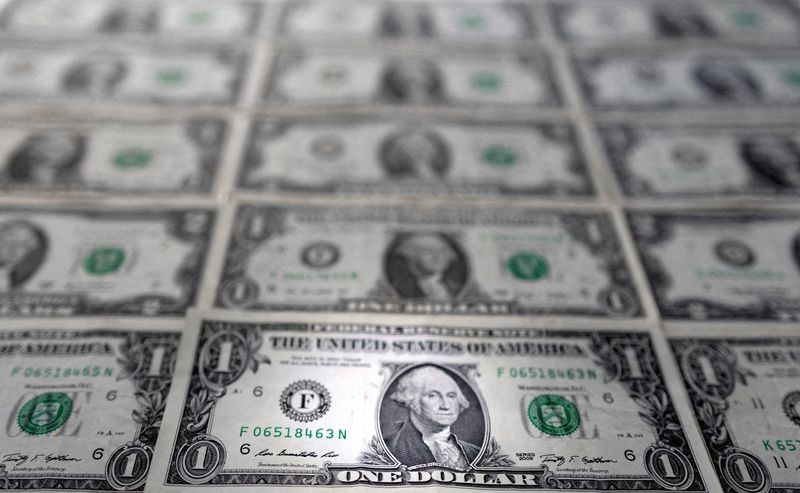Dollar falters as U.S. yields retreat amid recession risks
2022.06.29 05:51

FILE PHOTO: U.S. dollar banknotes are displayed in this illustration taken, February 14, 2022. REUTERS/Dado Ruvic
By Kevin Buckland
TOKYO (Reuters) – The dollar slipped against most major peers on Wednesday as a decline in U.S. yields took some of the sheen off the currency, with investors mulling the risk of a recession from aggressive Federal Reserve rate hikes.
The dollar index, which measures the greenback against six counterparts, eased 0.08% to 104.39, giving back some of its 0.53% rally overnight, spurred mainly by weakness in the euro.
Treasury 10-year yields slid more than 1 basis point in Tokyo, trading to around 3.17% as Asian equities followed Wall Street lower. U.S. shares fell after a steep drop in U.S. consumer confidence stoked worries about a slowdown as the Fed rushes to get inflation in check.
The euro rose 0.11% to $1.05315 after dipping to $1.05025 on Tuesday, after European Central Bank (ECB) chief Christine Lagarde offered no fresh insight on the path for European interest rates at the ECB’s annual forum.
The ECB is widely expected to follow its global peers by raising interest rates in July for the first time in a decade to try to cool soaring inflation, though economists are divided on the magnitude of any hike.
Lagarde and Fed Chair Jerome Powell will speak on a panel at the forum later on Wednesday.
“Recession risk will periodically undercut DXY (but) the broader medium-term uptrend likely persists a while yet,” Westpac strategists wrote in a client note, referring to the dollar index, which they see sticking to a range of 101 to 105 for now.
They added: “… the DXY is unlikely to peak until we are closer to the end of the Fed’s front-loaded tightening cycle.”
The dollar slipped 0.08% to 136.04 yen, while sterling rose 0.16% to $1.2204.
Despite the decline in equities, the risk-sensitive Australian and New Zealand dollars staged small rebounds from Tuesday’s declines against the greenback, with the Aussie up 0.07% and the New Zealand dollar rising 0.18%.








